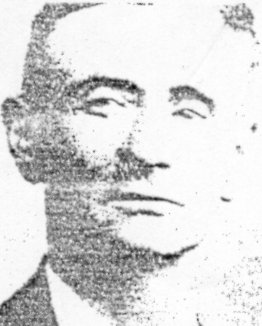This site is dedicated to the men and women, living and deceased, who dedicated their lives to the cause of Newry’s poor and dispossessed. W.F.Cunningham rightly holds a special place among this illustrious few.
As a young adult, William worked as a compositor (1912) with the Newry Reporter. He became local President of the Typographical Association of Ireland. In January 1914 W.F. was elected as the first ever Trades Union Labour Councillor on Newry Urban Council. He fought in the Great War and was invalided out when he was shot in the mouth. He became the first Labour vice-chairman of the Newry Board of Guardians, a position he utilised to advance the cause of the most disadvantaged of our society. This was the year of the great Dublin lockout and here in Newry (the home of the forebears of the great Jim Larkin, who led the Dublin workers) William advanced the cause of Newry labour. He was the first representative of his class to become a member of Newry Port and Harbour Trust. In later life, just before the outbreak of the second major conflagration of the century (in 1938 to be precise) he became the first Labour Chairman of Newry Council. Two years later he was appointed as Justice of the Peace. He also sat on the Technical School Committee and on the Free Library Committee.
These honours were peripheral to Cunningham’s life’s work on behalf of the disadvantaged. At every election he topped the poll as the Independent Labour candidate. He made himself available at all times and all hours, in the interests of pensioners, widows, orphans and the unemployed. He was once, uniquely, returned for both the North and the South Wards of the town.
Without doubt, Cunningham was a most conscientious local representative, spending hours, without recompense, filling out forms to help the poor win assistance from the Welfare State. He bailed out people from the Bridewell; buried people whose families could not afford the cost; fought to retain Newry’s windmill; agitated for the building of houses at O’Neill Avenue (where he later lived); and though fervently anti-Partitionist, won electoral support from all sections of our society.
This author pays special homage for his efforts on behalf of residents of the Workhouse. As a dedicated Guardian he lobbied for ‘special privileges’ such as the odd extra mug of tea, and occasionally bottle of stout. He lobbied to improve the lot of unmarried mothers there, who had to do the laundry for the hospital as well as the Workhouse, with their new-born babies resting in orange-boxes by their sides. He befriended country people there who had no visitors but himself.
When he once stood for the South Down Stormont seat, his opponents did not hesitate to play the sectarian (and the Communist!) cards against him. William, a fervent Christian, was forced once on an electoral platform, to produce his rosary beads to refute the allegations. The Church nevertheless was four-square in support for his opponent, Mr Collins.
At the opening of the new Abbey (Primary) School, W.F. disdained the fare on offer of Wine and Cheese, and the Brothers were forced to send to Annie Dowdall’s for a bottle of stout for their unorthodox guest Councillor! W.F. was famous too for the free trips to Cranfield beach that he organised for the poor children of Newry. He collected food parcels supplied by Newry’s business community for this purpose and prevailed on Jack Bannon to make free transport available for the trips.
Dangerously ill on the night of 8 January 1942, he still planned to go to an important meeting of the Gas Committee. He never made it, for that was the night of his demise. He was greatly missed.
